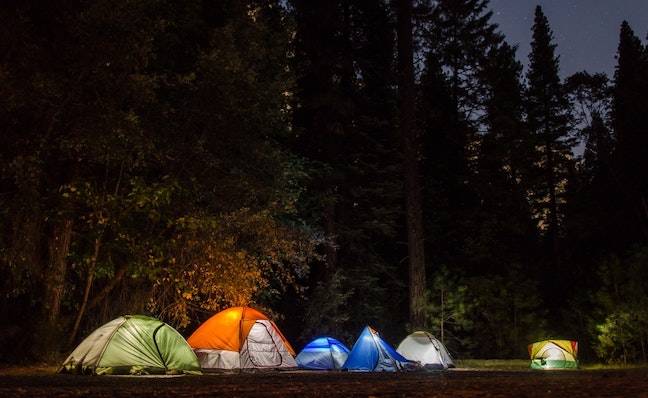Campgrounds in 22 counties around Washington state will begin to reopen starting June 1, the state announced May 29.
The Washington State Parks and Recreation Commission (Parks), Department of Fish and Wildlife (WDFW) and Department of Natural Resources (DNR) announced that camping will begin to resume in counties that are actively in Phase 2 of Gov. Inslee’s “Safe Start” plan and have also been approved for camping by county officials, according to a news release.
Overnight camping closed on March 23 to help reduce the spread of COVID-19 as a result of Gov. Inslee’s “Stay Home, Stay Healthy” order.
The reopening applies to campgrounds and various marine facilities, with a full list found on the Washington State Parks website.
Counties open to overnight camping include Adams, Asotin, Columbia, Cowlitz, Ferry, Garfield, Grant, Grays Harbor, Kitsap, Kittitas, Lewis, Lincoln, Mason, Pacific (parks at 50% capacity, DNR-managed sites closed), Pend Oreille, Skamania, Spokane, Stevens, Thurston, Wahkiakum, Walla Walla and Whitman.
Before packing your masks and marshmallows, individuals should check state agency websites for the status of individual campgrounds and dispersed camping, the state said.
State parks
Cabins, yurts and group campsites remain closed until further notice. Full refunds for their trips will be issued to visitors who have already made reservations at locations that were closed due to the pandemic, the state said. No action is required by reservation holders.
For open state parks, campers are encouraged to make reservations to ensure they will have a camping spot when they reach their destination and to reduce interactions with staff.
“This is an important milestone for the public and for parks,” said Washington State Parks and Recreation Commission Director Don Hoch. “This year, it’s especially important Washingtonians have access to outdoor recreation. We know that access to the outdoors is good for everyone’s health and well being. Camping is a big part of that outdoor experience.”
Washington Department of Fish and Wildlife
In counties approved for camping, Washington Department of Fish and Wildlife campgrounds and dispersed camping at wildlife areas will reopen, the state said. A list of open campgrounds is available on WDFW’s website.
WDFW lands do not offer draining or dumping facilities. All campers and recreational vehicles should be self-contained. “Pack in, pack out” is still a heavily emphasized habit throughout the state, advising campers to bring — and remove — their own supplies, including water, soap, hand sanitizer and toilet paper.
“Camping is a favorite summer activity in Washington and we’re so pleased to be in a place to reopen these opportunities for families to make their summer memories,” said Kelly Susewind, WDFW director. “We’re glad to invite people back to the wild for responsible overnight stays.”
Washington State Department of Natural Resources
Most campsites managed by the Washington State Department of Natural Resources will reopen on a rolling basis, the state said.
The opening of the campsite depends on the location of the site and maintenance needed, as most campsites on DNR land are first-come, first-serve and do not have running water. Site-specific information for June 1 reopenings of DNR lands is found on its website.
Visitors are encouraged to verify campsites are open before arrival and to have multiple backup options in case your first choice campsite is full. Garbage services are not available at the time, so campers should be prepared to take care of all personal hygiene needs and “leave no trace.”
“As summer arrives, a cherished family tradition is camping and enjoying the great outdoors together. Opening camping on our public lands is a step toward normalcy for all of us,” said Commissioner of Public Lands Hilary Franz. “While we get back outside, it is imperative to do all we can to keep ourselves, our families, and our communities safe by recreating responsibly. We must always be vigilant in our fight against COVID-19, practicing good physical distancing and proper hygiene, so we can continue to enjoy camping with our families throughout the summer.”
Tips for responsible camping
- Help prevent wildfires by never leaving a campfire unattended. If it is too hot to touch, it is too hot to leave. Always check for burn bans before lighting a campfire. Fires should remain inside DNR-approved fire rings on site.
- Check if your destination is open before you head out.
- Choose destinations close to home to reduce the need to stop along the way.
- Follow the rules of the campground to limit the risk to both visitors and staff.
- Come prepared and bring all the supplies you need, including firewood and all the items you need to take care of your personal hygiene needs.
- Limit the number of people in your party to five or less, unless you’re all within the same household.
Talk to us
Please share your story tips by emailing editor@kentreporter.com.
To share your opinion for publication, submit a letter through our website https://www.kentreporter.com/submit-letter/. Include your name, address and daytime phone number. (We’ll only publish your name and hometown.) Please keep letters to 300 words or less.

